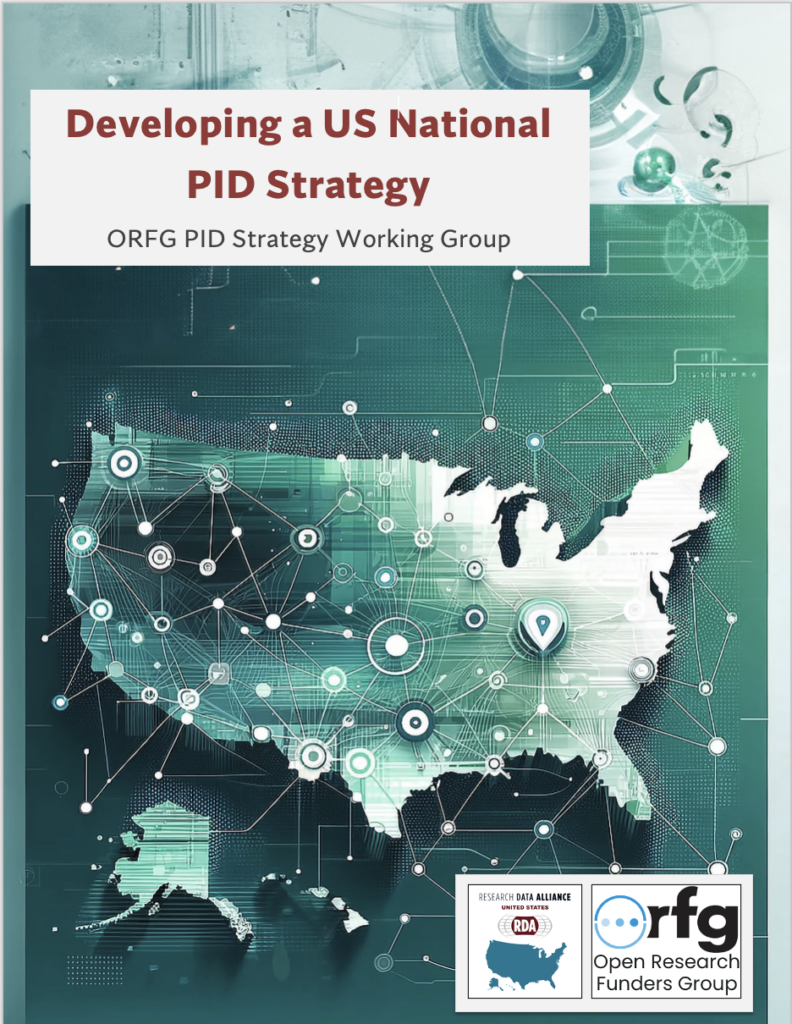This week a collaborative team working in partnership with the various open research organizations released a report that seeks to advance interoperability, simplify output tracking, and improve the overall process of scholarly research communication by focusing on the need for a US national strategy for persistent identifiers (PIDs). Utilizing the frameworks created by the Research Data Alliance, the Developing a US National PID Strategy report was created in collaboration with members of the Higher Education Leadership Initiative for Open Scholarship (HELIOS Open) community and the Community Effort on Research Output Tracking workstreams group organized by the Open Research Funders Group (ORFG).

Scholarly communications have advanced significantly in the past two decades. Looking over the landscape and the diversity of resources that are now shared, we have collectively moved well beyond an ecosystem where journal articles and books were the primary vehicles of scholarly communication for which researchers are recognized. Supporting this diversity is a maturing network of infrastructure, systems and data exchange protocols. A robust network of repositories for data, for software, for preprints, for methods and research protocols, as well as other grey literature has developed. Researchers can now connect many of these items with specialized persistent identifiers for these outputs, as well as linking them back to their professional profiles. These tools already provide important increases in productivity, in the FAIR-ness of the resources, in research assessment, and ultimately in the pace of scientific discovery.
Yet many gaps remain. New systems are needed for remaining elements of the network, such as for software, projects, protocols, and research facilities. Extensions must be made to numerous systems. Data quality needs to be improved. Implementation and adoption should become universal. Integrations to take advantage of the interoperability need to become commonplace. Investments will need to continue over the long term. As awareness of the critical role of supporting this infrastructure has grown, a recognition that consistent application of data and identifiers along with interoperable systems are vital to a well-functioning environment.
Despite its often dominant role in scholarly communications, unfortunately, the US has not been a first mover when it comes to adopting a national PID strategy. Outside the US, Alice Meadows described last year in the Scholarly Kitchen “Why PID Strategies are having a moment” and that momentum has only continued to grow. Just last week, the Australians via ARDC released their finalized National PID Strategy and Roadmap. The UK, Canada, Finland, and the Netherlands, among others, have also released national strategies.
Several barriers have existed to developing a consistent approach in the US. One of the unique challenges of the American research landscape is its diversity and heterogeneity. Research takes place in a variety of organizations, from public and private research institutions at the state and local levels, companies, government agencies, as well as the public at large. Funding is provided by federal agencies, state governments, institutions themselves, as well as a vast network of philanthropic organizations. Few are empowered to set forward a consistent strategy or are positioned to develop the consensus necessary for broad implementation. Those organizations in positions of influence have been reluctant to state definitive guidance in defining explicit identifiers to be used across the ecosystem, not wanting to unduly influence community direction or adoption.
In an effort to move the US research community forward and building upon guidance from the White House Office of Science and Technology Policy (OSTP), a collaboration of more than 30 volunteers organized by the ORFG began work to outline a National PID strategy in late 2022. Utilizing the framework created by the RDA National PID Strategies Interest Group, and building on federal implementation guidance, as well as the outputs of other national strategies initiatives, the group set out principles and actions the community should take. The report describes a framework for evaluating PID infrastructure and describing their use cases and benefits, rather than simply listing a set of proscribed identifiers. These principles should be aligned with national strategies described in various OSTP memos, as well as guidance from other forums, and consistent with the goals of open science that are generally agreed to be beneficial.
The working group that developed this plan has included representatives from a wide swath of research, infrastructure, and funding organizations. The report they produced and released on Tuesday, Developing a US National PID Strategy includes background on the US research landscape as well as related Federal guidance on open science that relates to PIDs, a proposed set of users, values, and recommendations for how to advance PID use in research communications.
The report outlines the benefits of PIDs, their associated metadata, and the systems that connect them in advancing open scholarship goals in the United States. It provides information on the research and policy landscape associated with PIDs, discusses the value of PID infrastructure, and offers recommendations for effective utilization of PIDs in connecting and tracking research outputs.
Most importantly, it offers a set of recommendations regarding persistent identifiers that can be applied to numerous elements of the research landscape across the US, including governmental entities, infrastructure providers, research institutions, public and private funding bodies, publishers, content providers, and other stakeholders. Ideally, this guidance will be widely adopted by organizations throughout the research ecosystem in the US and potentially adapted globally in other national contexts around the world, as part of a growing movement to deploy national persistent identifier strategies. By proffering this set of proposed recommendations, the group seeks to engage in this global conversation on how the network of parties engaged in research support can scholar’s work more seamlessly.
Furthermore, the document provides some context about the policy environment in the US as well as the role of PIDs in the US and International ecosystems. It then progresses to describing stakeholders and outlines the benefits of embracing PIDs. The report then turns to highlighting desirable characteristics of PID systems, recommendations on evaluating PID infrastructures, and strategies for supporting this ecosystem. It also includes sections for supporting this infrastructure, areas for additional investment, and guidance for measuring success.
After a period of public review and discussion, the core recommendation components of the report will be moved to a consensus process within National Information Standards Organization (NISO) to develop the report into a national standard, which can further its adoption and implementation. A proposal to begin this process at NISO is expected to be submitted later this spring and, if approved, with a subsequent working group to formalize the document beginning its work later this year.
For those who would like to engage in a conversation about the report, a discussion thread has been organized on the PIDForum website. There is also a separate discussion thread as part of the RDA PID National Strategies Working Group where feedback is also welcome. The team encourages discussion of the report and welcomes community input and feedback on its guidance as the project moves forward to its next stages.
Disclosure: I served as co-chair of this ORFG PID Strategies working group along with co-chair John Chodacki from the California Digital Library. The full list of working group members is included in the report. Thanks to all those that contributed to the report and all that will implement its recommendations.



